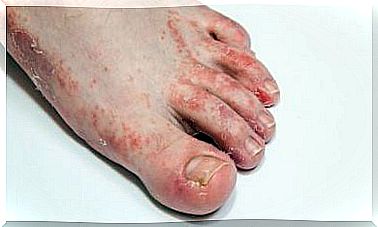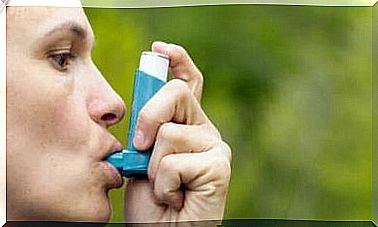The 9 Main Causes Of Nosebleeds

In the vast majority of cases, nosebleeds have nothing to do with a serious disorder. However, it is not a symptom that you should take lightly. This can be a problem if it happens often or if it is too intense.
This is a symptom that most people have experienced at least once throughout our lives. In fact, almost everyone knows some kind of home remedy to tackle it! In any case, it is always best to know the reasons why you may get nosebleeds. Most of them are not cause for concern.
Nosebleeds: A common problem
Estimates suggest that at least 60% of the population has experienced nosebleeds at some point. There are many blood vessels in the nasal cavity, and most of them are relatively superficial. About 95% of cases of nosebleeds occur in the area near the nostrils, and we refer to it as “anterior epistaxis.”
The type of bleeding that originates in the deepest part of the nose, it is referred to as “posterior epistaxis”. It is common in these cases to lose a larger amount of blood, so it is more difficult to deal with. This type of bleeding requires immediate medical attention.
Also read: 6 natural remedies to stop nosebleeds
Nosebleeds are more common among children under 10 years of age and adults over 45 years of age. You can get it at any age. The main reasons for this happening are:
1. Dryness
Many cases of nosebleeds are due to a lack of moisture in the nasal cavity. This is because it leads to dryness and therefore bleeding occurs as a consequence. The problem occurs when a person does not breathe through the nose and does not keep it clean. It can also occur as a result of viruses or allergies. In any case, it is not serious.

2. Foreign bodies can lead to nosebleeds
It is relatively common for children to insert objects into their nose (such as fingers!) Without parents or caregivers noticing. Thus, bleeding may occur. After a few days, it can even come along with pus, a bad odor and difficulty breathing. These cases must be attended to by a trained physician.
3. Hay fever
Hay fever (Allergic rhinitis) is not always accompanied by nosebleeds, but this symptom is found in many cases. This type of nosebleed is spontaneous and usually takes place at night. You should not worry too much about it, but should consult a doctor who can advise you on how to control this allergy.
4. Injuries can cause nosebleeds
Injuries are the most common cause of nosebleeds. They can occur when you get a blow, pick your nose or brush your nose too hard. Homemade measures are usually enough to stop this kind of nosebleed.
However, more severe strokes in the nasal cavity or skull can also lead to bleeding and they require immediate medical attention.
5. A dry environment
There are times when the environment is too dry, mainly due to heating or air conditioning. This dries out the nasal mucosa so any small lesion will lead to bleeding. You can improve this with some home remedies.

6. Certain medicines
Certain drugs, such as anticoagulants and antithrombotic agents, make people more available for nosebleeds. Likewise, excessive use of nasal spray against congestion also causes bleeding.
7. Von Willebrand’s disease
This is a serious condition that looks like a kind of hemophilia (haemophilia). It is a genetic problem that causes coagulation problems. Thus, frequent and heavy nosebleeds can be a symptom of this disorder. If this is the case for you, make sure you see a doctor as soon as possible.
Also read: What to do if you get nosebleeds
8. Other diseases often lead to a bleeding nose
There are other serious diseases that cause heavy and frequent nosebleeds. Among them are leukemia, malignant tumors and liver disease. You should contact a doctor if your bleeding is frequent and heavy.
9. Other causes
There are times when a benign tumor puts pressure on the blood vessels that supply the nose and cause bleeding. Likewise, changes in atmospheric pressure or altitude can also lead to nosebleeds. This mainly happens when traveling by plane or going up a very high mountain.
In short, most cases of nosebleeds should not be a source of concern. However, it is important to discuss them with your doctor, especially if they happen often.









